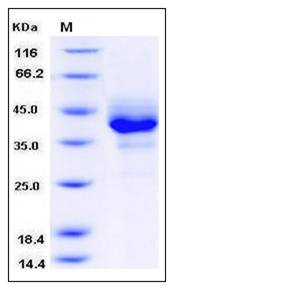Human TNFRSF17 / BCMA / CD269 Protein (His & Fc Tag)
BCM,BCMA,CD269,TNFRSF13A
- 100ug (NPP4321) Please inquiry
| Catalog Number | P10620-H03H |
|---|---|
| Organism Species | Human |
| Host | Human Cells |
| Synonyms | BCM,BCMA,CD269,TNFRSF13A |
| Molecular Weight | The recombinant human TNFRSF17/Fc is a disulfide-linked homodimer. The reduced monomer comprises 302 amino acids after removal of the signal peptide and has a predicted molecular mass of 34 kDa. As a result of glycosylation, the apparent molecular mass of rh TNFRSF17/Fc monomer is approximately 40 kDa in SDS-PAGE under reducing conditions. |
| predicted N | Met 1 |
| SDS-PAGE |  |
| Purity | > 85 % as determined by SDS-PAGE |
| Protein Construction | A DNA sequence encoding the extracellular domain of human TNFRSF17 (NP_001183.2) (Met 1-Ala 54) was fused with the C-terminal polyhistidine-tagged Fc region of human IgG1 at the C-terminus and a signal peptide at the N-terminus. |
| Bio-activity | Measured by its binding ability in a functional ELISA . Immobilized recombinant human BAFF at 1 μg/ml (100 μl/well) can bind human TNFRSF17 . The EC50 of human TNFRSF17 is 0.07 μg/ml. |
| Research Area | Cardiovascular |Angiogenesis |Cytokine & Receptor |Tumor Necrosis Factor & Receptor |TNF receptor |
| Formulation | Lyophilized from sterile PBS, pH 7.4 1. Normally 5 % - 8 % trehalose and mannitol are added as protectants before lyophilization. Specific concentrations are included in the hardcopy of COA. |
| Background | Tumor necrosis factor receptor superfamily, member 17 (TNFRSF17), also known as B cell maturation antigen (BCMA) or CD269 antigen, is a member of the TNF-receptor superfamily. This receptor is preferentially expressed in mature B lymphocytes, and may be important for B cell development and autoimmune response. This receptor has been shown to specifically bind to the tumor necrosis factor (ligand) superfamily, member 13b (TNFSF13BBAFF), and to lead to NF-kappaB and MAPK8/JNK activation. TNFRSF17/BCMA/CD269 also binds to various TRAF family members, and thus may transduce signals for cell survival and proliferation. TNFRSF17/BCMA/CD269 is a receptor for TALL-1 and BCMA activates NF-kappaB through a TRAF5-, TRAF6-, NIK-, and IKK-dependent pathway. The identification of TNFRSF17 as a NF-kappaB-activating receptor for TALL-1 suggests molecular targets for drug development against certain immunodeficient or autoimmune diseases. TNFRSF17/BCMA is a target of donor B-cell immunity in patients with myeloma who respond to DLI. Antibody responses to cell-surface BCMA may contribute directly to tumor rejection in vivo. |
| Reference |
